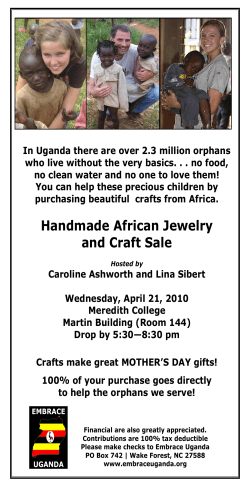
AMNESTY INTERNATIONAL FACTS AND FIGURES
AMNESTY INTERNATIONAL FACTS AND FIGURES Making Love a Crime: Criminalization of Same-Sex Conduct in Sub-Saharan Africa Homosexuality is still illegal in 38 African countries (Algeria, Angola, Benin, Botswana, Burundi, Cameroon, Comoros, Egypt, Eritrea, Ethiopia, Gambia, Ghana, Guinea, Kenya, Lesotho, Liberia, Libya, Malawi, Mauritania, Mauritius, Morocco, Mozambique, Namibia, Nigeria, Sao Tome and Principe, Senegal, Seychelles, Sierra Leone, Somalia, South Sudan, Sudan, Swaziland, Tanzania, Togo, Tunisia, Uganda, Zambia, Zimbabwe) There is no criminal law against homosexuality in 16 African countries (Burkina Faso, Cape Verde, Central African Republic, Chad, Congo-Brazzaville, Cote d’Ivoire, Democratic Republic of Congo, Djibouti, Equatorial Guinea, Gabon, Guinea-Bissau, Madagascar, Mali, Niger, Rwanda, South Africa) In Mauritania, Sudan, northern Nigeria, and southern Somalia, individuals found guilty of ‘homosexuality’ face the death penalty The last five years have witnessed attempts to further criminalize homosexuality in Uganda, South Sudan, Burundi, Liberia, and Nigeria Cape Verde decriminalized homosexuality in 2004, and since 2009, Mauritius, Sao Tome and Principe, and the Seychelles have also committed to decriminalizing homosexuality. South Africa has seen a number of positive legal developments over the past decade, including allowing joint adoption by same-sex couples in 2002, introducing a law on legal gender recognition in 2004, and equal marriage for same-sex couples in 2006. South Africa has also seen at least seven people murdered between June and November 2012 in what appears to be targeted violence related to their sexual orientation or gender identity. Five of them lesbian women and the other two were non gender-conforming gay men. In Cameroon, Jean-Claude Roger Mbede was sentenced to three years in prison for ‘homosexuality’ on the basis of a text message he sent to a male acquaintance. In Cameroon, people arrested on suspicion of being gay can be subjected to forced anal exams in an attempt to obtain ‘proof’ of same-sex sexual conduct. In most countries, laws criminalizing same-sex conduct are a legacy of colonialism, but this has not stopped some national leaders from framing homosexuality as alien to African culture. A cave painting in Zimbabwe depicting male-male sex is over 2000 years old Historically, woman-woman marriages have been documented in more than 40 ethnic groups in Africa including in Nigeria, Kenya, and South Sudan. In some African countries, conservative leaders openly and falsely accuse LGBTI (lesbian, gay, bisexual, transgender and intersex) individuals of spreading HIV/AIDS and of ‘converting’ children to homosexuality and thus increasing levels of hatred and hostility towards LGBTI people within the broader population. LGBTI individuals are more likely to experience discrimination when accessing health services. This makes them less likely to seek medical care when needed, making it harder to undertake HIV prevention work for, and to deliver treatment where it is available. In many government programs they are not identified as an ‘at risk’ group, and therefore are not catered for in national HIV treatment and prevention programs. As a result, many are denied access to crucial treatment for HIV and other medical issues. In South Africa’s Gauteng province, 7.6 percent of black gay men and 8.4 percent of black lesbians reported being refused medical treatment because of their sexual orientation. Men who have sex with other men are nine times more likely to contract HIV than other men. Additionally, an LGBTI activist arrested in Uganda in 2008 was denied medical care for diabetes while in custody. Arrests for same-sex conduct have been on the rise in the past decade as more regressive policies are enacted. In Cameroon, where there have been 51 documented arrests for same-sex conduct since 2005, people are often detained for up to 48 hours and forced to submit to anal examinations. In Uganda, the harsh 2009 Anti-Homosexuality Bill has led to more cases of people turning their friends and neighbors in to the authorities than previously. Lesbians are more often deliberately targeted for sexual violence. Some deem this practice “curative” or “corrective” rape, laboring under the belief that if the victim has sex with a man, she will be “cured” of being a lesbian. Lesbian girls and women in Cameroon can be forced into heterosexual relationships and condemned to double lives. A member of the Cameroonian national soccer team was kicked out of school under lesbian suspicions. Seven lesbians were arrested at a September 2009 Soweto, South Africa pride event and abused in police custody. Amnesty International is a Nobel Peace Prize-winning grassroots activist organization with more than 3 million supporters, activists, and volunteers in more than 150 countries campaigning for human rights worldwide. The organization investigates and exposes abuses, educates and mobilizes the public, and works to protect people wherever justice, freedom, truth, and dignity are denied. ### For more information, visit www.amnestyusa.org Twitter: @AIUSAmedia Facebook: Amnesty International USA
© Copyright 2026











